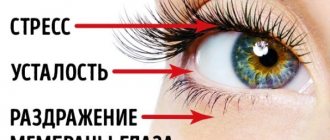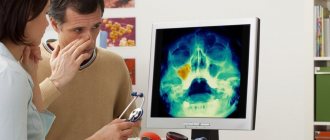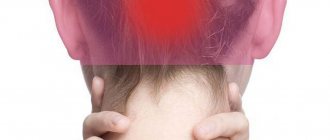Stopping breathing during sleep, or more precisely, repeated stops of breathing indicate the presence of a serious disease - sleep apnea syndrome.
The person with apnea, for obvious reasons, does not notice or remember what happens to him in his sleep. As a rule, the problem is first noticed by his relatives, who, watching the sleeping person, see how he repeatedly stops breathing for 10, 20, 40 or more seconds, and often turns pale or blue when breathing stops.
The disease of respiratory arrest is observed in 5-7% of people, and in hypertensive patients and those suffering from coronary artery disease its frequency reaches 30%. But despite the widespread prevalence of the disease, surprisingly little is said about sleep apnea syndrome.
I feel suffocated at night: why and what does this mean?
Sleep is a state of the human body caused by the normal functioning of the brain. For proper rest, a person needs to sleep 8 hours a day, and the 4th part of this time should be in the deep sleep stage. The shorter this phase, the more difficult it is for the body to recover.
Some people wake up at night from lack of air. They are scared and do not understand what is happening to them. The reason for this phenomenon is the cessation of respiratory movements - apnea (ancient Greek ἄπνοια - calmness, lack of breathing). Sometimes several such attacks occur during the night, moreover, they can be repeated several times within one minute.
As a result of an attack of apnea, the amount of oxygen entering the lungs decreases, the person leaves the stage of deep sleep, and sometimes wakes up. No wonder he feels exhausted the next day.
Lack of oxygen in the blood leads to loss of strength in the morning and disruption of metabolic processes in the body. In acute hypoxia, the heart and brain are affected.
How often do you have attacks?
USEFUL INFORMATION: Why do you drool during sleep?
Prevention and recommendations for shortness of breath
Physiological shortness of breath goes away on its own after the person has rested. However, if the problem arose acutely and suddenly, the following measures should be taken to alleviate his condition:
- Calm down and sit on a sofa or chair, comfortably resting your back;
- Remove or unfasten tight clothing, a belt that is too tight;
- Provide fresh air by opening a window or door;
- Humidify the air by hanging a pre-wetted sheet near the patient;
- Offer a herbal sedative.
If a person knows about his illness and he has drugs that alleviate his condition, he should be offered to drink them. If he does not feel better within fifteen minutes, he will have to call an ambulance.
There is no specific prevention in this case. However, you can minimize the risk of developing this condition by following these rules:
- Maintaining an active, healthy lifestyle;
- Avoiding excessive physical activity and stress;
- Body weight control;
- Timely treatment of diseases;
- Systematic completion of preventive studies.
Remember: lack of air can be a sign of serious pathological conditions. That is why CELT specialists recommend promptly finding out its causes and taking appropriate measures!
Make an appointment through the application or by calling +7 +7 We work every day:
- Monday—Friday: 8.00—20.00
- Saturday: 8.00–18.00
- Sunday is a day off
The nearest metro and MCC stations to the clinic:
- Highway of Enthusiasts or Perovo
- Partisan
- Enthusiast Highway
Driving directions
A person suffocates in his sleep: all possible reasons
Lack of air during sleep is a serious problem. If a person complains: “I suffocate at night when falling asleep, it becomes suddenly difficult to breathe, I can’t breathe,” sometimes the cause is a common runny nose. However, in some cases, more serious pathologies are present, as listed below.
Obstructive sleep apnea
Cessation of pulmonary ventilation within 10 seconds, caused by a weakening of the tone of the muscles and soft tissues of the throat, as a result of which the airways are blocked and oxygen ceases to flow. A person suffering from this disease feels tired throughout the day. This is perhaps the main manifestation of this pathology. If the patient is overweight, he should sleep only on his side to avoid suffocation.
Another manifestation of apnea is loud snoring that suddenly stops and then resumes again. It can signal that a person has stopped breathing.
Hypopnea
This is the next reason for lack of air. Patients complain that they seem to forget how to breathe in their sleep. This pathology manifests itself in that the airways are half blocked by soft tissues and it takes 10 seconds or more to restore breathing.
Central sleep apnea
It occurs due to disturbances in the functioning of the brain when there is a failure in the transmission of nerve impulses that cause contraction of the respiratory muscles. The brain seems to forget that the body needs oxygen, and the person briefly holds his breath and stops breathing.
INTERESTING FACTS!
- According to the dream book, if a person suffocates in a dream, this means that serious changes in life await him, and deprivation is possible. Another interpretation is being dependent on a certain person or on certain circumstances.
- From a scientific point of view, such a dream plot can be dictated by physiology: when breathing becomes difficult or stops during apnea, a person experiences suffocation in his dream. However, according to surveys and studies, patients diagnosed with sleep apnea do not see such dreams more often than healthy people.
Acid reflux
Choking occurs because the muscles that keep stomach contents from returning to the esophagus weaken. The acid gets into the throat and causes a severe cough, making it difficult to breathe. Thanks to coughing, the throat clears after some time. An important symptom of acid reflux is a sharp feeling of heartburn in the chest area, which can wake a person up.
USEFUL INFORMATION: Causes of snoring during sleep
You can get rid of the pathology by changing your lifestyle: eat small portions, have dinner four hours before bedtime. To prevent acid from the esophagus from entering the respiratory tract, it is recommended to sleep on high pillows: this way you will not suffocate.
Nocturnal asthma attacks
If bronchial obstruction occurs at night, suffocation also occurs.
The person begins to cough, cannot breathe, feels like he is suffocating. Signs of developing an attack of bronchial asthma (appear simultaneously):
- labored breathing;
- coughing;
- wheezing;
- heaviness in the chest;
- arrhythmia.
Postnasal drip
Associated with the accumulation of large amounts of mucus in the nasopharynx and usually develops against the background of a runny nose.
In certain cases, it can occur in completely healthy people. In this case, thick mucus gets into the back of the throat or the back of the nose, blocking the movement of air, and it becomes difficult to breathe. Dizziness and convulsions are symptoms indicating the presence of this pathology. They, however, can also be observed in nephropathy and multiple sclerosis. Therefore, it is necessary to undergo an examination as soon as possible to find out the true nature of the problem.
Types of shortness of breath
Shortness of breath
During significant physical exertion, the body does not have enough oxygen, so usually in such cases the breathing rate increases. This is the so-called physiological shortness of breath
. However, if shortness of breath occurs with light exertion or at rest (for example, in a lying position), then its nature is pathological.
It is of great importance which stage of breathing causes difficulty - inhalation or exhalation. Shortness of breath that occurs during inspiration is called inspiratory dyspnea
, on exhalation -
expiratory shortness of breath
. Mixed shortness of breath is also common, in which both inhalation and exhalation are difficult.
Sleep apnea in a child
Apnea is especially dangerous in children under one year of age, which is due to the imperfection of their respiratory system. If a child suffocates during sleep, this may be due to the following reasons:
- insufficient formation of respiratory centers (in premature infants);
- birth injuries;
- gastroesophageal reflux disease (GERD);
- infections;
- anomalies in the structure of ENT organs;
- adenoids or chronic tonsillitis;
- allergic reactions to microorganisms living in pillows and bedding (the most common cause in adolescents);
- asthma;
- bronchospasm;
- runny nose;
- dry air in the room.
Apnea symptoms
In children, symptoms of sleep apnea manifest themselves through attention deficit hyperactivity disorder, as well as urinary problems. But snoring and holding your breath, contrary to popular belief, are not always related to each other. Not every person who snores suffers from breath-holding, and vice versa - not all people with apnea snore. The main symptoms of apnea in adults are as follows:
- irritability;
- memory impairment;
- constant feeling of fatigue;
- chronic lack of sleep.
How to prevent sleep apnea
Under no circumstances should one ignore such a dangerous pathology as sleep apnea. Most often, the person suffering from it does not suspect anything, because he simply does not remember what happens to him at night. But close people may notice something is wrong. If you have problems breathing during sleep, the first thing to do is to find out the cause of apnea in order to choose the right treatment. To do this, you need to see a doctor and undergo a medical examination, which includes:
- Blood tests - general, lymphocytes, immunoglobulins, CEC, protein.
- Analysis of urine.
- Sputum examination.
- X-rays of light.
- ECG.
- Allergen tests.
- Appointment with an allergist and otolaryngologist.
USEFUL INFORMATION: Why you constantly want to sleep and lethargy: reasons
Further action depends on the results of the examination.
- If the patient has very enlarged adenoids or tonsils, they are offered to be removed surgically. If the septum is deviated, it is recommended to have it corrected.
- When a person is obese, he is prescribed a special diet to normalize his weight.
- For bronchial asthma, long-acting bronchodilators taken in the evening will help prevent night attacks.
- If respiratory arrest is caused by a neurological disease, drug treatment is prescribed.
- To correct a weakened, flabby palate, radio waves are used (this method is considered the most effective, as it allows you to permanently rid a person of the occurrence of apnea attacks at night), liquid nitrogen and laser (not popular).
If the treatment methods described above do not help, resort to CPAP therapy. The patient sleeps in a mask, where a special device creates comfortable pressure, which allows him to breathe normally and sleep peacefully throughout the night.
Treatment of shortness of breath
Treatment of shortness of breath
Shortness of breath is not an independent disease, but a symptom indicating a malfunction of certain organs. To make it easier to diagnose the disease, before visiting a doctor, try to answer the following questions:
- When did you notice that shortness of breath appeared?
- Does shortness of breath always occur after physical exertion, or does it bother you even at rest?
- What is more difficult - inhaling or exhaling?
- In what position does it become easier to breathe?
- What other symptoms bother you? This may include chest pain, swelling, weakness, dizziness, cough, and fever.
Traditional methods of treating apnea
There are also traditional medicine recipes that help combat sleep apnea. Here are some of them:
- Before going to bed, it is necessary to free the nasal passages from the accumulation of mucus and crusts in them. To do this, it is recommended to rinse your nose with warm boiled water with the addition of sea salt.
- In the evening you need to drink a glass of freshly squeezed white cabbage juice mixed with one teaspoon of honey (you need to take the product for a month).
If you use folk recipes in addition to drug treatment, you can get rid of the problem much faster. However, before trying any recipe on yourself, you should definitely consult your doctor.
How does the disease occur?
Sleep apnea occurs because the pharynx, which is normally a hollow tube through which air flows to the lungs and back, at some point becomes completely closed for a number of reasons. In this case, doctors talk about the development of obstructive apnea syndrome, from the word “obstruction” - blockage.
Much less often it happens differently: the problem arises at the level of the central nervous system. The brain's respiratory center works intermittently and transmits impulses to the muscles of the chest and abdominal muscles irregularly, which leads to interruptions in breathing during sleep. This type of apnea is called central.











